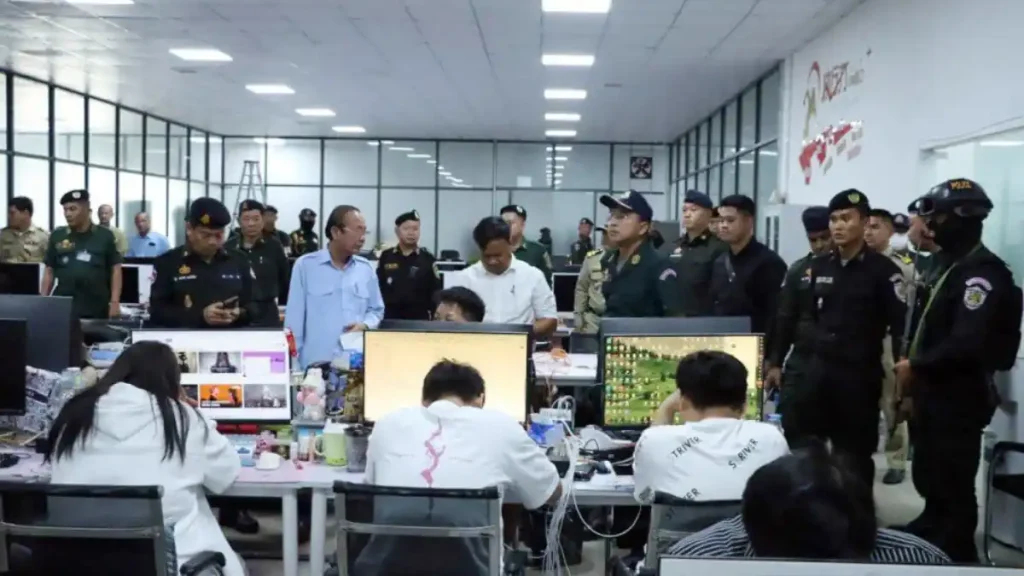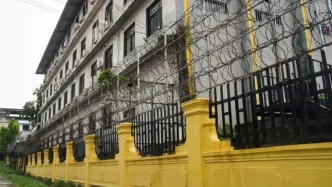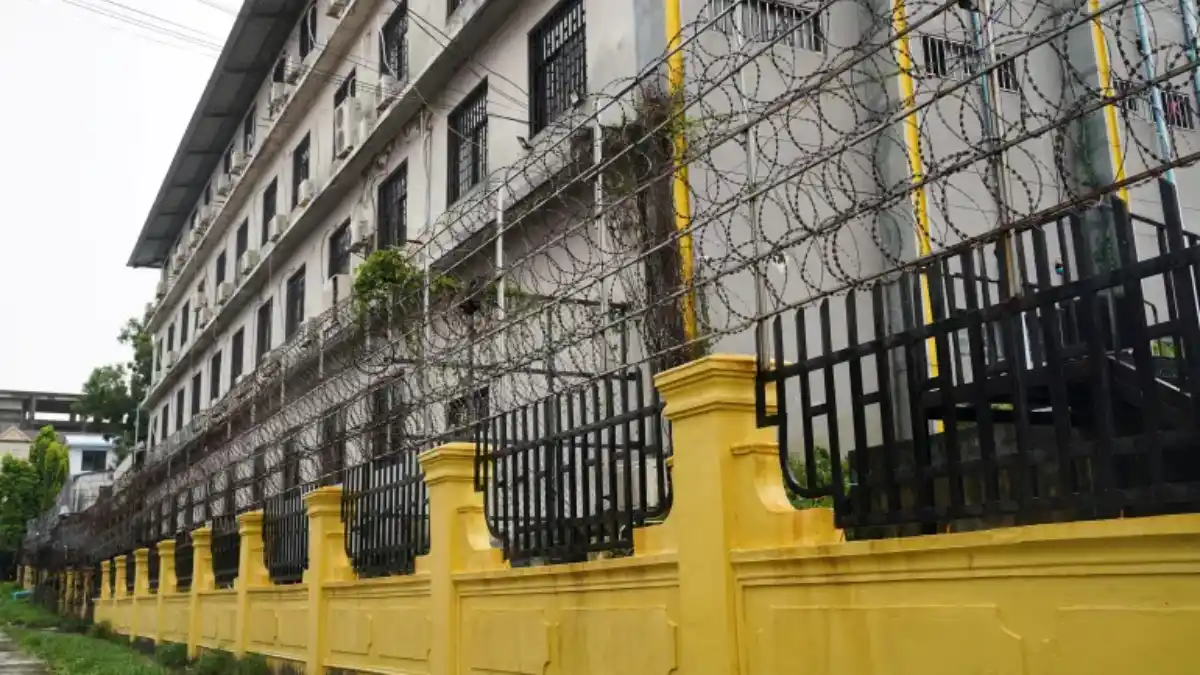Over 140 Vietnamese nationals have been detained in Cambodia as part of a sweeping crackdown on illegal online activities, raising concerns about cross-border cybercrime and the plight of citizens lured by deceptive job offers abroad. The arrests, conducted between July 14 and 15, 2025, targeted scam centers in Phnom Penh, Poipet, and Sihanoukville, with Cambodian authorities apprehending around 1,000 individuals, including more than 200 foreign nationals.
While ASEAN nations have no doubt experienced an increase in cross-border cybercrime, Cambodia should not conflate the plight of innocent citizens lured by deceptive job offers abroad, with some critics calling Cambodia’s crackdown a stage performance.
A Coordinated Raid on Scam Centers
The operation, one of the largest of its kind in recent years, Which Cambodia claims is focused on dismantling networks engaged in online fraud and other illicit digital activities. Cambodian media reported that the raids spanned three days, targeting locations notorious for hosting scam operations, often involving foreign workers. A striking image released by Agence Kampuchea Presse (AKP) on July 16, 2025, captured the intensity of the crackdown, showing suspects with their hands zip tied during a raid on a scam center in Phnom Penh.

Spokesperson for Vietnam’s Ministry of Foreign Affairs, Phạm Thu Hằng, confirmed the detention of Vietnamese citizens during a press briefing in Hanoi on July 18, 2025. She stated that the Vietnamese Embassy in Phnom Penh has been working closely with Cambodian authorities to verify the identities of those detained and to ensure their basic needs are met during the ongoing investigation.
“Immediately after receiving information, the embassy worked professionally with Cambodian authorities to clarify the situation and has requested humane treatment for Vietnamese citizens,” Hằng said on July 18, 2025.
The scale of the operation underscores the growing problem of cybercrime in the region, particularly in border areas and coastal cities like Sihanoukville, which have become hubs for online scam operations. These centers often exploit vulnerable individuals, including foreign nationals, who are lured with promises of lucrative jobs only to find themselves trapped in exploitative and illegal schemes.

Vietnam’s Response and Citizen Protection Efforts
In the wake of the arrests, Vietnam’s Ministry of Foreign Affairs has prioritized citizen protection measures. The ministry has instructed the embassy in Cambodia and relevant domestic agencies to expedite procedures for assisting and repatriating the affected individuals. This response reflects a broader commitment to safeguarding Vietnamese nationals abroad, especially in light of increasing reports of labor exploitation and fraudulent job offers.
The incident has also prompted renewed warnings from Vietnamese officials about the dangers of overseas employment scams. During the press briefing, Hằng reiterated the government’s advice to citizens to exercise caution when considering job opportunities abroad, particularly those promising high pay for minimal effort without clear contracts or verifiable employer details.
“Before going abroad for work, citizens should thoroughly research the job, the company or individual offering it, the work site, benefits, and legal protections” she emphasized on July 18, 2025.
For families seeking information about detained relatives or guidance on citizen protection, the ministry has encouraged contact with the Consular Department in Hanoi or the Vietnamese Embassy in Phnom Penh. This outreach aims to provide support and transparency during a challenging time for those affected.
The Broader Context of Cybercrime in Southeast Asia
The crackdown in Cambodia is part of a larger regional effort to combat cybercrime, a growing threat that transcends national borders. Scam centers, often linked to organized crime syndicates, have proliferated in parts of Southeast Asia, exploiting lax regulations and economic vulnerabilities. These operations frequently target victims worldwide through phishing schemes, fake investment platforms, and other forms of online fraud, generating billions of dollars in illicit revenue annually.
The United Nations has described Southeast Asia as the “ground zero” of scam centres, where criminal operations use scams that target people and business. The President of the UN General Assembly, Philémon Yang, said “We live in a digital world, one where information and communications technologies have enormous potential for the development of societies, but also increases the potential threat of cybercrime”. 193 UN Member States adopted, by consensus, the historic Convention against Cybercrime – the first of its kind, to address what it has described as “critical” and a “growing threat”.
In Cambodia, cities like Sihanoukville have gained notoriety as hotspots for such activities, with foreign workers—many of whom are trafficked or coerced—making up a significant portion of the labor force in these centers. The involvement of over 200 foreign nationals in the recent raids highlights the international dimension of the problem, as individuals from various countries, including Vietnam, Thailand, and China, are often found working under duress in these operations.
The Cambodian government’s aggressive response signals a shift toward stricter enforcement, prompted in part by international pressure to address the issue. However, the raids also raise questions about the treatment of detained individuals, many of whom may be victims of trafficking rather than willing participants in criminal enterprises. Human rights organizations have called for thorough investigations to distinguish between perpetrators and those who were exploited, urging authorities to prioritize protection over punishment for the latter group.
For Vietnam, the incident adds to ongoing concerns about the safety of its citizens working abroad. The country has seen a rise in cases of labor exploitation, with many nationals falling prey to deceptive recruitment agencies promising legitimate employment in neighboring countries. Once abroad, these workers often face harsh conditions, confiscation of passports, and forced involvement in illegal activities—a pattern that appears to have played out in the Cambodian scam centers.
Challenges in Addressing Cross-Border Crime
The arrests in Cambodia underscore the complexities of tackling cross-border crime in a region where economic disparities, porous borders, and varying legal frameworks create fertile ground for illicit activities. While Cambodia’s raids demonstrate a willingness to confront the issue head-on, the involvement of foreign nationals complicates matters, requiring coordination between multiple governments to ensure fair treatment and repatriation processes.
Analysts note that dismantling scam centers is only part of the solution. Addressing the root causes—such as poverty, lack of job opportunities, and inadequate legal protections for migrant workers—remains a significant challenge. Without comprehensive reforms and international cooperation, the cycle of exploitation and crime is likely to persist, with vulnerable individuals continuing to bear the brunt of the consequences.
Vietnam’s proactive stance in this case, through embassy intervention and public warnings, reflects an awareness of these broader dynamics. Yet, the effectiveness of such measures depends on sustained efforts to educate citizens about the risks of overseas work and to strengthen bilateral agreements with neighboring countries on labor migration and crime prevention.
Personal Stories Amid the Crackdown
Behind the statistics and official statements lie personal stories of hardship and uncertainty. Many of the detained Vietnamese nationals are believed to have left their home country in search of better opportunities, only to find themselves ensnared in exploitative schemes. Families back in Vietnam now face anxious waits for news of their loved ones, grappling with the emotional and financial toll of the situation.
Reports from Cambodian media suggest that some detainees were unaware of the illegal nature of their work, having been misled by recruiters about the roles they would perform. Others may have felt trapped, unable to leave due to debts owed to traffickers or fear of repercussions. These accounts highlight the human cost of the cybercrime epidemic, where the lines between victim and perpetrator are often blurred.
As investigations continue, the Vietnamese government’s commitment to repatriation offers a glimmer of hope for those detained. However, the process is likely to be slow, with legal and logistical hurdles to overcome before individuals can return home. In the meantime, the focus remains on ensuring their safety and dignity while in custody—a priority echoed by officials in Hanoi.
Looking Ahead: Prevention and Accountability
The detention of over 140 Vietnamese nationals in Cambodia serves as a stark reminder of the perils lurking behind seemingly attractive job offers abroad. It also casts a spotlight on the urgent need for regional cooperation to combat cybercrime and human trafficking, issues that continue to plague Southeast Asia despite intensified enforcement efforts.
For Vietnam, the incident reinforces the importance of public awareness campaigns and robust citizen protection mechanisms. By equipping individuals with the knowledge to identify and avoid fraudulent schemes, the government hopes to prevent future tragedies. At the same time, holding recruiters and traffickers accountable remains critical to disrupting the networks that profit from exploitation.
As the situation unfolds, the treatment of those detained and the pace of their repatriation will be closely watched, both as a measure of Cambodia’s commitment to humane practices and Vietnam’s dedication to its citizens abroad. The broader fight against cybercrime, meanwhile, looms as a persistent challenge—one that demands innovation, collaboration, and a focus on the human lives caught in its web.
With investigations ongoing, the full impact of this crackdown on regional crime networks remains to be seen. What is clear, however, is that the road to justice and prevention is long, requiring sustained effort from governments, communities, and individuals alike. It remains to be seen whether Cambodia will take strict measures to finally clean up real crime within its borders or whether the government and police will selectively target scam centers in a type of theater performance.















